Key takeaways:
- Understanding international regulations is essential for successful cross-border operations, as they directly impact compliance and market dynamics.
- Compliance in trade safeguards reputation and operational efficiency, with a proactive framework leading to new opportunities and partnerships.
- Future trends indicate a movement towards regulatory harmonization, technology integration (like AI), and a focus on sustainability, which will shape global business strategies.
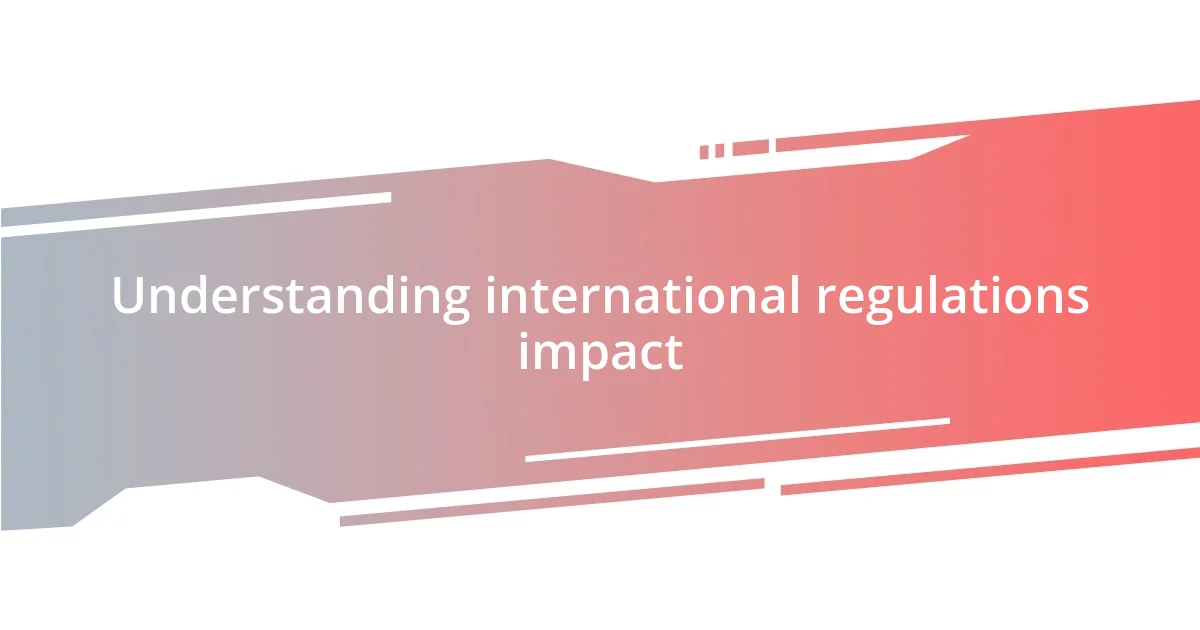
Understanding international regulations impact
Understanding the impact of international regulations is crucial. I remember a time when I was working on a project that spanned multiple countries. The different regulatory environments made it challenging to align our strategies. How could we move forward without a clear understanding of each country’s compliance issues? It became obvious that regulations could dictate not just our operations, but also our success.
Delving deeper, I often wonder how many businesses underestimate the ripple effects of these regulations. When countries impose new rules, it can shift market dynamics overnight. For example, when the European Union introduced stricter data protection laws with GDPR, companies worldwide scrambled to comply. I felt the urgency in our team meetings as we discussed how these changes would redefine our data practices, often with a sense of anxiety about the potential penalties for non-compliance.
Furthermore, I’ve noticed that regulations can also inspire innovation. When I worked with a tech startup navigating these complexities, we found that regulations encouraged us to develop more robust systems that prioritized security. It’s fascinating how a constraint can lead to creativity, isn’t it? By embracing these regulations as opportunities rather than obstacles, we positioned ourselves ahead of competitors who were caught off guard. Understanding this dynamic has been pivotal in my professional journey.
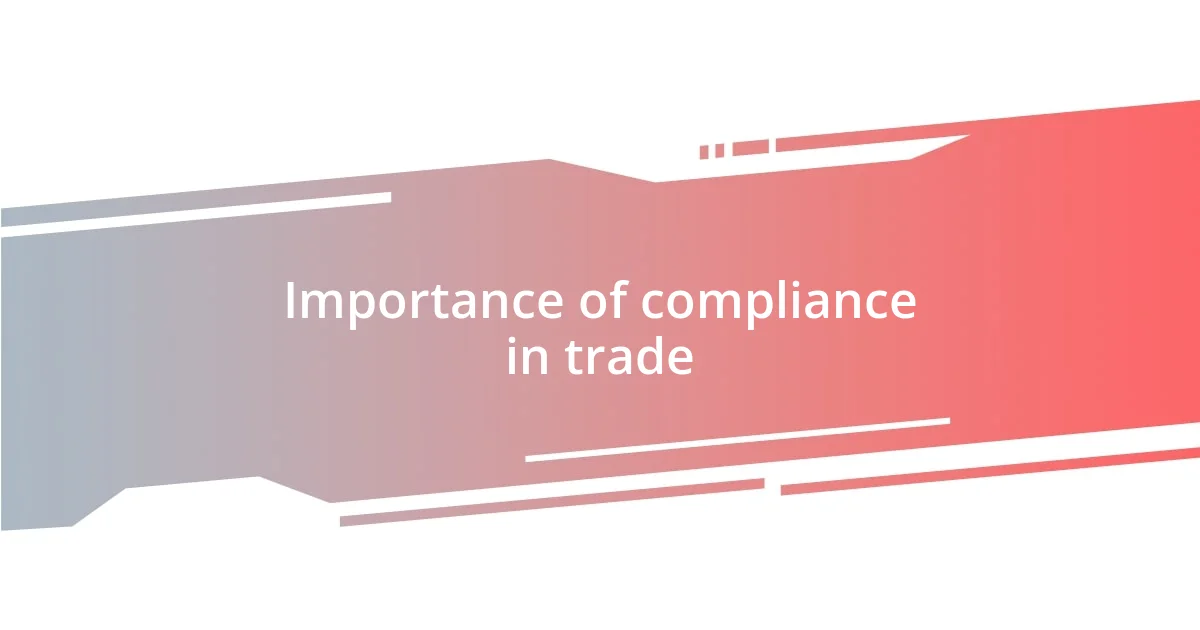
Importance of compliance in trade
Compliance in trade is not just a regulatory checkbox; it’s a vital component that can shape a company’s reputation and longevity in the market. I once witnessed a small business falter when they ignored import regulations for a crucial shipment. The subsequent fines and lost trust were devastating, reminding me that the costs of non-compliance can far outweigh initial savings.
- Ensures smooth operations by avoiding delays and disruptions.
- Enhances customer trust and loyalty through transparent practices.
- Minimizes financial risks associated with penalties and legal issues.
- Promotes a competitive edge in markets with stringent regulations.
- Encourages a culture of accountability within the organization.
Reflecting on my experiences, I cannot stress enough the peace of mind that comes from a solid compliance framework. I remember a project where meticulous attention to trade regulations not only avoided pitfalls but also opened doors to new partnerships. It’s a classic case of “an ounce of prevention is worth a pound of cure.” By prioritizing compliance, businesses not only navigate the regulatory landscape effectively but often find untapped opportunities lying within the constraints.
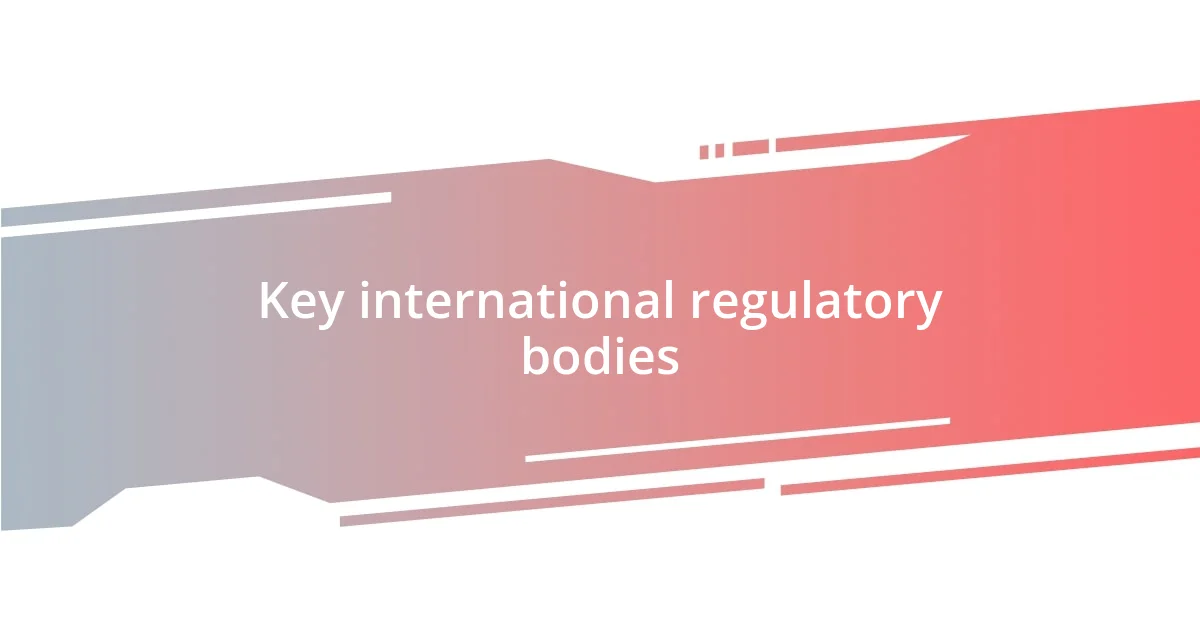
Key international regulatory bodies
Regulatory bodies play an essential role in shaping international trade and compliance standards. For instance, during a recent collaboration with a European firm, I learned firsthand how the European Commission’s regulations impact everything from product standards to environmental compliance. It was eye-opening to see how these guidelines not only set the tone for European markets but also ripple across the globe, affecting even companies based in other continents.
The World Trade Organization (WTO) is another critical player. I recall attending a seminar where experts discussed how WTO agreements facilitate trade by promoting fair competition and reducing trade barriers. The conversations illuminated a vital lesson: Ignoring the WTO’s guidelines can put businesses at a competitive disadvantage and stifle growth.
Navigating international regulations can be daunting, especially when there are so many entities to consider. But understanding their influence can unlock numerous opportunities for innovation and collaboration. I’ve often advocated for developing strong relationships with these regulatory bodies, as they can provide invaluable resources and insights that can shape a business’s trajectory.
| Regulatory Body | Main Focus |
|---|---|
| European Commission | Market regulations, product standards, and environmental laws |
| World Trade Organization (WTO) | Trade agreements and dispute resolution |
| International Organization for Standardization (ISO) | Quality management and safety standards |
| Financial Action Task Force (FATF) | Combatting money laundering and terrorist financing |
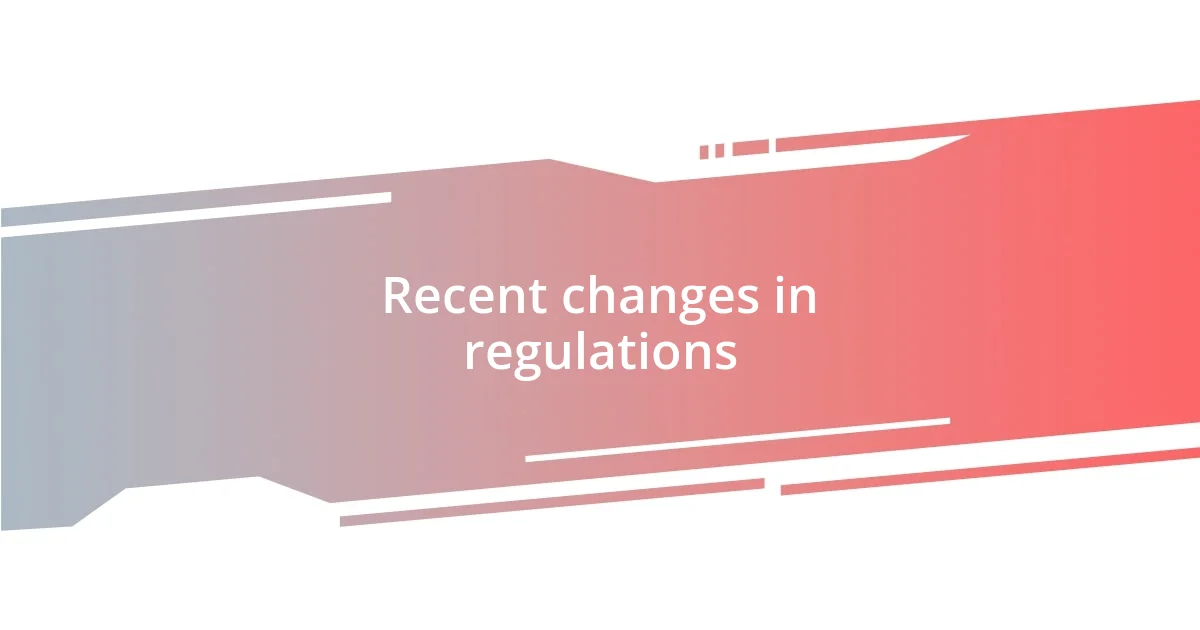
Recent changes in regulations
The recent shifts in international regulations are hard to ignore, especially in light of increasing global tensions and the push for sustainability. I recently attended a workshop where the effects of the updated General Agreement on Tariffs and Trade (GATT) were discussed. The revisions aim to foster more equitable international trading practices, but they also pose challenges for businesses to adapt quickly to new compliance requirements. This got me thinking: How often do we truly assess the impact of these changes on our operations?
Another noteworthy change I’ve noticed is the tightening of regulations surrounding data protection, particularly with the introduction of measures similar to the European Union’s General Data Protection Regulation (GDPR) across various countries. Just last month, I had a client who faced potential legal ramifications due to their failure to comply with these emerging data laws. It made me realize that what may seem like a mere bureaucratic hurdle can have real consequences on business integrity and customer trust.
Moreover, environmental regulations are evolving rapidly, especially in response to global climate change mandates. My experience with a manufacturing firm that had to overhaul their processes to meet new environmental guidelines illustrated this shift vividly. Witnessing the strain this caused initially, but seeing the long-term benefits in community goodwill and operational efficiency, taught me that embracing these regulatory changes can lead to unexpected advantages. How are you preparing to meet these new challenges?
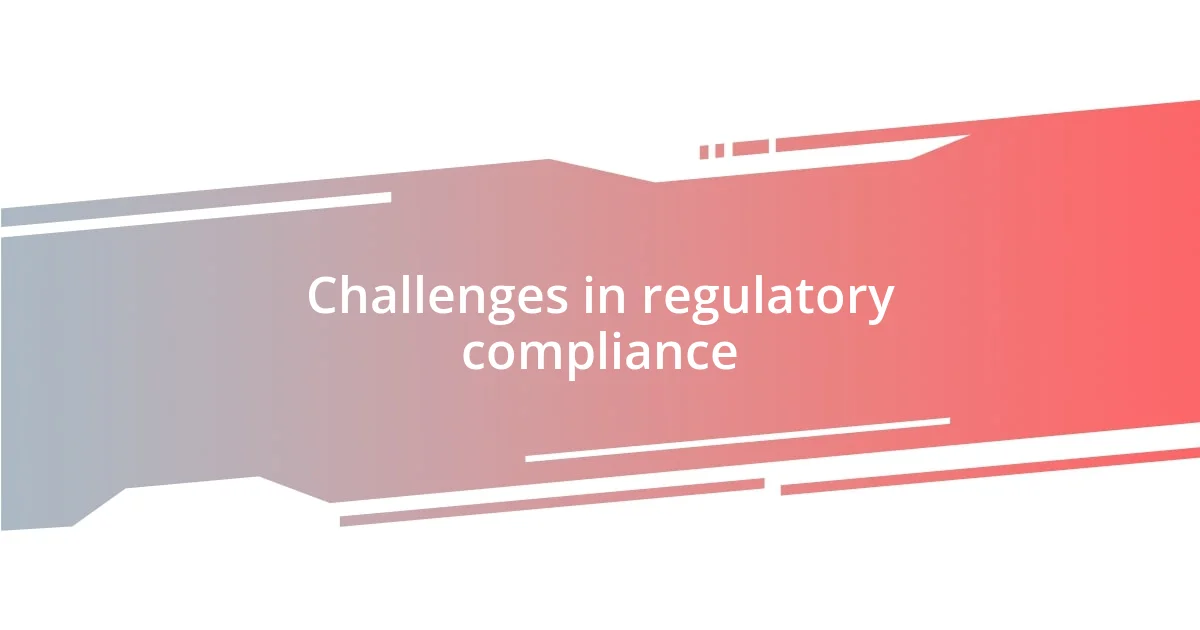
Challenges in regulatory compliance
Navigating the maze of international regulatory compliance can often feel overwhelming. I remember a time when my team faced a compliance audit for a multinational project, and the sheer volume of regulations from different jurisdictions was staggering. It was a rigorous process, and I found myself questioning: How can one organization keep track of so many evolving rules? This experience really emphasized how challenging it can be to ensure consistent compliance across borders.
One of the most significant challenges I’ve encountered is the rapid pace at which regulations change. During a recent project, I discovered that a new import regulation had been implemented just months before our products were due to launch. That pressure to adapt quickly taught me that staying informed requires constant vigilance. Have you ever felt that sense of urgency when trying to align your operations with sudden regulatory changes?
Moreover, I’ve witnessed how compliance doesn’t just bring additional work; it often strains relationships with partners and suppliers. I recall a collaborative project that encountered friction because a supplier couldn’t meet the new environmental standards. The tension felt palpable, and it struck me how regulatory changes could disrupt not just operations but also the very fabric of working relationships. It’s a reminder that, beyond regulations, we must prioritize clear communication and flexibility to overcome these hurdles together.
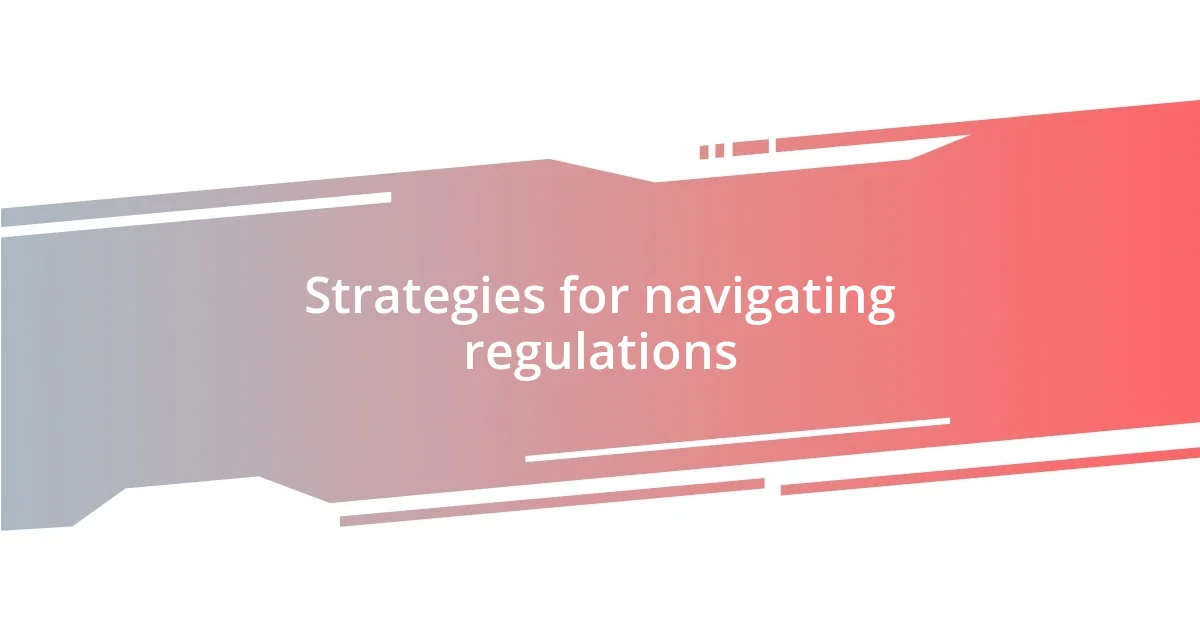
Strategies for navigating regulations
One effective strategy for navigating regulations is proactive education. I once took it upon myself to enroll in an international trade compliance course after a confusing experience with varying tariff codes. It was an eye-opener! This decision not only clarified the complexities I was facing but also fostered a deeper understanding in my team. Have you ever considered how investing time in education could turn these regulatory challenges into opportunities for growth?
Establishing a robust network of industry contacts is another fantastic approach. I recall attending a roundtable discussion where industry experts shared their regulatory experiences. The insights exchanged were invaluable; one connection even guided me through a tricky compliance challenge I was facing. By surrounding yourself with knowledgeable individuals, you’re not just building support; you’re also creating a safety net that can help mitigate the risks associated with rapid regulatory changes.
Finally, I’ve found that implementing technology can significantly simplify tracking regulatory updates. When my previous employer integrated a compliance software, I felt an immense weight lift off my shoulders. The software sent real-time updates and reminders, allowing us to stay ahead of changes without becoming overwhelmed. Have you ever tried using technology to streamline your operations? It’s a game-changer that allows you to focus more on strategic initiatives rather than getting bogged down by compliance details.
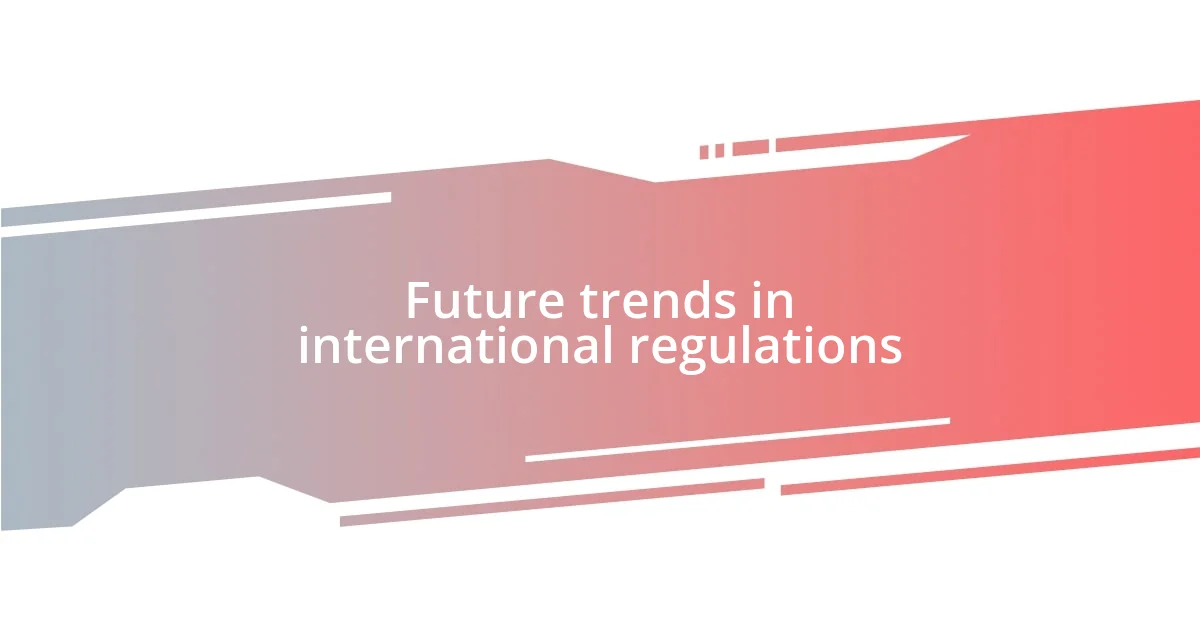
Future trends in international regulations
As I look toward the future of international regulations, I sense a trend toward greater harmonization. During a recent conference, I came across various representatives discussing the need for standardized regulations across borders. This unification could streamline compliance and reduce confusion for businesses operating globally—a prospect that feels like a breath of fresh air. Have you ever wished for a day when regulations could be navigated as smoothly as a single, universal road map?
Moreover, the impact of technology on regulatory frameworks cannot be overstated. I remember a discussion with a regulatory officer who expressed excitement about integrating artificial intelligence and analytics into compliance processes. This shift not only promises to enhance efficiency but also to predict and adapt to regulatory changes in real-time. Isn’t it fascinating to think about how AI could transform our approach to compliance, almost like having a regulatory assistant at our fingertips?
Lastly, there’s a growing emphasis on sustainability regulations worldwide, as climate change becomes an irrevocable part of our reality. I recently attended a workshop focused on the emerging standards regarding carbon footprints and sustainable practices. It struck me how companies will soon need to incorporate these regulations into their strategies, ensuring that environmental considerations become core elements of business compliance. In this evolving landscape, how prepared do you feel to adapt to these expectations? Embracing sustainability might just be the new frontier for international regulatory success.














